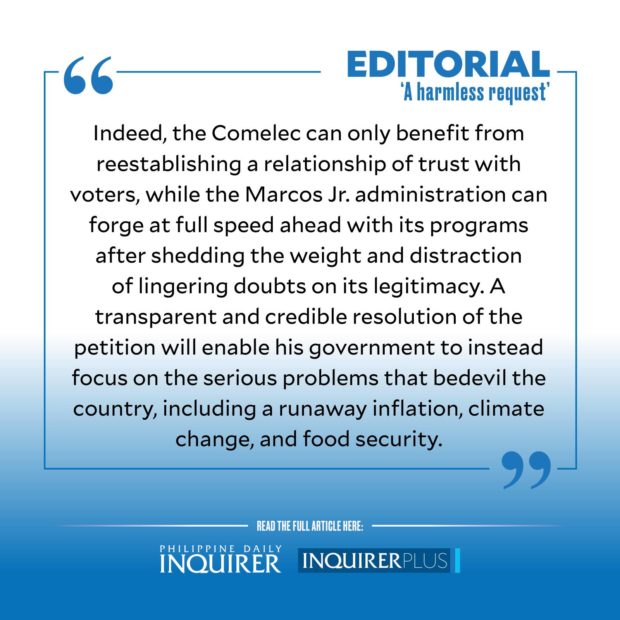‘A harmless request’
 The petitioners have described it as a “harmless request … an easy task requiring virtually (no) budget,” nor a massive amount of preparation.
The petitioners have described it as a “harmless request … an easy task requiring virtually (no) budget,” nor a massive amount of preparation.
All they’re asking the Supreme Court, according to the petitioners led by Eliseo Rio Jr., former chief of the Department of Information and Communications Technology (DICT), is for the high court to direct the Commission on Elections (Comelec), its technology provider, and several telcos, to preserve the transmission logs of the May 9, 2022 elections so that their “historically important” data may be reviewed in a future case.
“The prayer here does not call for any tectonic shift in policy. The prayer here is a harmless request asking the telecommunication companies to keep, not delete, data that someday may inspire patriotism in the hearts of the youth and future citizens of our country,” said Rio and fellow petitioners Augusto Lagman of the National Citizens’ Movement for Free Elections and a former Comelec commissioner, and Franklin Ysaac, former president of the Financial Executives Institute of the Philippines.
The three noted that unless the Supreme Court issued a mandamus and a temporary restraining order on the respondents, the crucial information in the transmission logs may be expunged in accordance with the cybercrime law or Republic Act No. 10175, which says that data provided by a service provider “shall be preserved for a minimum period of six months from the date of… receipt.” This means the transmission logs may be expunged starting Nov. 9, or six months after their entry on May 9. The high court has yet to respond to the 100-page court pleading.
Aside from the Comelec, named respondents in the petition are technology provider Smartmatic and the three major telecommunication firms Smart Communications Inc., Dito Telecommunity Corp., and Globe Telecom Inc.
The respondent telcos should also be asked to deliver copies of the transmission records, the petitioners urged the high court.
Rio said the group filed the petition after noting the difference in the peak transmission time between the transparency server and official Comelec data, with the Parish Pastoral Council for Responsible Voting (PPCRV) server showing peak transmission at 8:02 p.m. on May 9, while Comelec data showed it at around 9:30 p.m.
The transparency server logged more than 20 million votes an hour after the voting closed at 7 p.m., while Comelec data indicated only 12 million votes transmitted within that period, Rio noted. He also questioned the speed with which the votes were transmitted, given that under the Comelec General Instructions, eight printed and signed copies of the precinct election return must be accomplished before transmission can be made. With this process taking at least 30 minutes after closing time, the earliest transmission would credibly come after 7:30 p.m. “It is impossible for the transparency server to have shown 1.5 million votes by 7:17 p.m.,” the former DICT head said in a social media post.
“It seems that the transparency server was conditioning the minds of the public as to what the official results [would] be,” Rio added in a recent statement.
In response, the PPCRV clarified that as a poll watchdog, it can only receive and transmit figures released by the transparency server over which the Comelec had “full administrative and managerial control.”
Although Comelec spokesperson Rex Laudiangco had initially brushed off Rio’s claims of irregularity and dispelled speculations of “preloaded” poll results, he recently welcomed the filing of the petition and assured that “the Comelec [would] abide by any order or process of the Supreme Court.”
But why belabor the process involved in an election where President Marcos Jr. was already proclaimed winner, with 31.6 million out of 55.5 million votes cast? Even his rivals chose not to contest the results. Can’t we just move on?
Then again, how difficult would it be to preserve the transmission logs to address the doubts expressed by some quarters on the integrity of the election? Wouldn’t the petition be the perfect opportunity to regain the “serious loss of trust and confidence in the electoral system,” as Inquirer columnist Segundo Romero put it in his recent column? Such doubts could be “a continuing silent drag on the organization and mobilization of political energy at various levels,” Romero added.
The columnist noted that two international observer missions fielded across the country, the Asian Network for Free Elections and the International Observer Mission, had “raised concerns about the trustworthiness of the results because of the failure of voting machines in greater numbers than in the 2016 and 2019 elections,” among other issues.
Indeed, the Comelec can only benefit from reestablishing a relationship of trust with voters, while the Marcos Jr. administration can forge at full speed ahead with its programs after shedding the weight and distraction of lingering doubts on its legitimacy. A transparent and credible resolution of the petition will enable his government to instead focus on the serious problems that bedevil the country, including a runaway inflation, climate change, and food security.




















